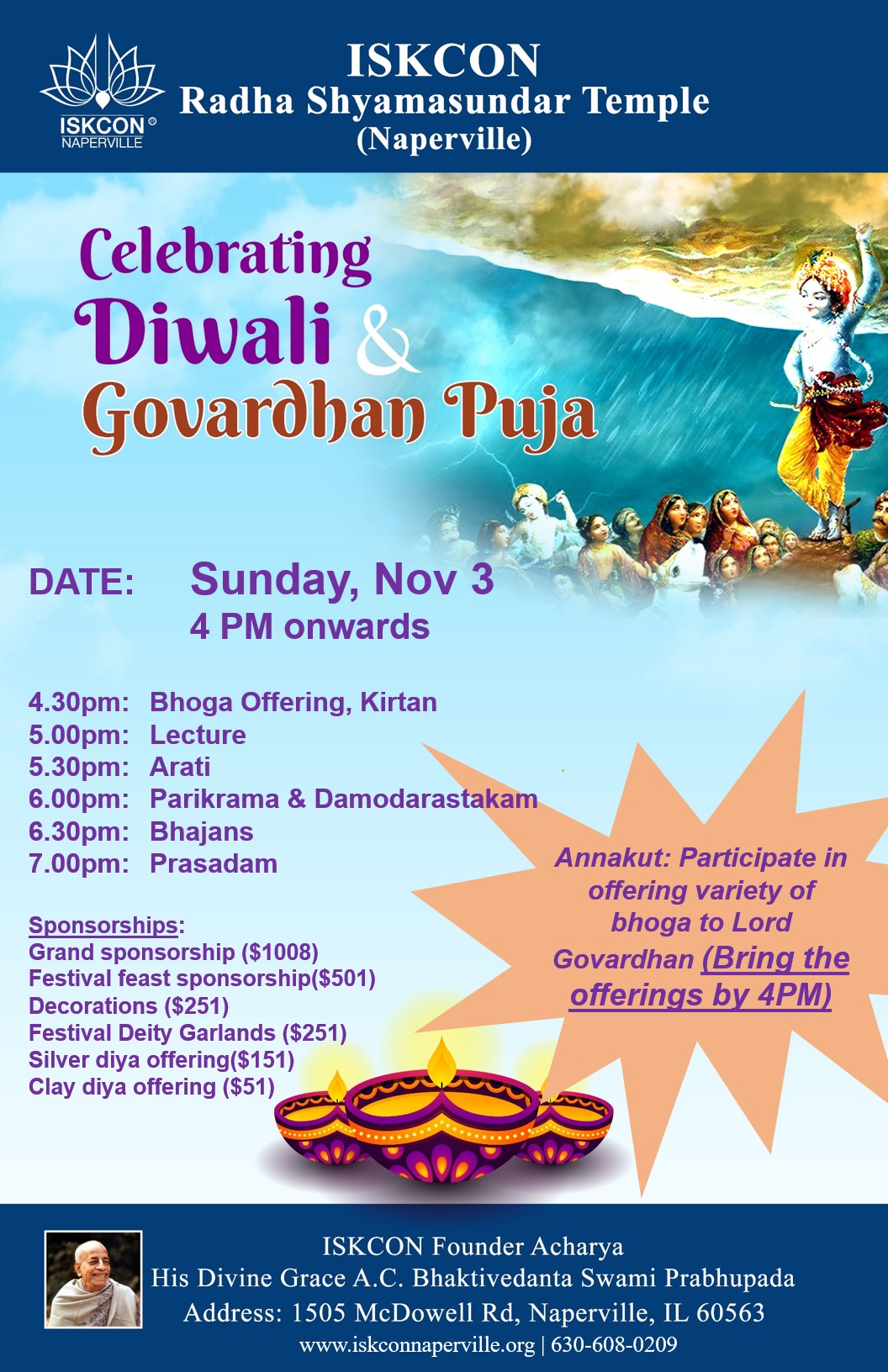Celebrating Govardhan Puja & Diwali on Sunday November 3rd 2024

The Glories Of Damodara Masa
Whatever one does for Krishna – at any time, at any place, under any circumstance – is to one’s eternal benefit
Such is the benefit of devotional service in general. However, during certain times of year–such as appearance anniversaries of Lord Krishna and His devotees–the benefits of one’s service are compounded.
During the month of Damodar, or Kārttika (October/November), rewards for service to Krishna are greater than at any other time of year. For instance, Krishna always likes tulasi leaves, so it’s always a good time to offer tulasi leaves to Krishna. However, in the Hari-bhakti-vilas of Sanatan Goswami, we find these statements:
“The result one obtains by giving ten thousand cows in charity can be obtained by offering only one tulasi leaf to the Supreme Lord during the month of Kārttika.” (7.335) and…
“Those who worship Lord Hari with an offering of one hundred thousand tulasi leaves during the month of Kārttika certainly advance on the path of pure devotional service, which includes liberation, with each leaf offered. (7.336)”
It is easy to understand the importance of the following statement, though, considering that Yamaraja is the universal superintendent in charge of meting out punishment to those who transgress karmic law:
“For a devotee who worships Lord Vishnu with offerings of malati flowers in the month of Kārttika, Yamaraja orders the removal of all his sinful reactions from the account book.” (7.90-92)
Whatever you offer–tulasi, malati, ghee lamps, time, energy, attention–takes on greater significance this month.
Kārttika could be thought of as the ultimate “buy one, get a-whole-lot-more free” sale, or the equivalent of a “super, multi-triple word score” in the game of Scrabble. For a limited time only, whoever is lucky (or greedy, or intelligent) enough to do some service for Krishna during this special month gets a uniquely huge return on their investment. The ultimate return: one becomes more Krishna conscious.
It was during Kārttika that Krishna allowed Himself to be bound with ropes by His mother, Yasoda. Out of loving anger at her transcendentally naughty child, she tied him (dama) around the abdomen (udara) with ropes. Thus the month of Kārttika is also known as the month of Damodara, “He Who was bound around the abdomen”.
Srila Prabhupada discusses this at some length in Nectar of Devotion (quoting Padma Purana):
“During this month, in Vrndavana it is the regulative principle to pray daily to Lord Krishna in His Damodara form. The Damodara form refers to Krishna in His childhood when He was tied up with rope by His mother, Yasoda. Dama means ‘ropes,’ and udara means ‘the abdomen.’ So mother Yasoda, being very disturbed by naughty Krsna, bound Him round the abdomen with a rope, and thus Krishna is named Damodara.” (Chapter 5, page 42)
He elaborates on this in the section “Performing Devotional Service in Kārttika:” “… in the month of Kārttika (October-November); especially in Vrndavana, there is a specific program for temple worship of the Lord in His Dāmodara form. “Dāmodara” refers to Krishna’s being bound with rope by His mother, Yaśodā. It is said that just as Lord Dāmodara is very dear to His devotees, so the month known as Dāmodara or Kārttika is also very dear to them.
The execution of devotional service during Ūrja-vrata in the month of Kārttika is especially recommended to be performed at Mathurā. This system is still followed by many devotees. They go to Mathurā or Vrndavana and stay there during the month of Kārttika specifically to perform devotional services during this period.”
“Those who worship Lord Hari with an offering of one hundred thousand tulasi leaves during the month of Kārttika certainly advance on the path of pure devotional service, which includes liberation, with each leaf offered. (7.336)”
Prabhupada makes a point to say it is “especially recommended” to perform devotional service during Kārttika in Mathura, or Vrindavana. This is not to say that Kārttika’s benefits are exclusively available there, but devotees who are able to go make the trip if at all possible.
“Urja-vrata” refers to the acceptance of special vows during Kārttika. Devotees often take vows to increase their hearing, chanting, worship, or to observe restrictions in their eating. Making and keeping such vows during the month of Damodara guarantees compounded benefits.
Srila Prabhupada ends Nectar of Devotion’s section on Kārttika with an interesting commentary from Padma Purana:
“…the Lord does not award devotional service to ordinary persons who are not serious about it. But even such unserious persons who execute devotional service according to the regulative principles during the month of Kārttika, and within the jurisdiction of Mathurā in India, are very easily awarded the Lord’s personal service.” (N.O.D., Chapter 12)